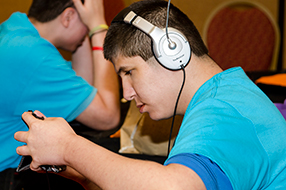
June 11, 2015 | By: Rosemary Alexander, PhD, Pathways to Adulthood Transition Coordinator, Texas Parent to Parent
Categories: Transition to Adulthood
So what's the big deal about transition? Why do we all keep talking about it? When should it happen?
Transition is the natural process of your child moving from childhood to adulthood, but that process for a child with disabilities involves many decisions and changes that may concern families. The goal of transition is having services, a structure, and a life ready when your child graduates from high school. If you don't do the transition planning and preparation, your child may have nothing to do and no one to do things with after graduation. A good life after graduation happens when parents, the child, the school, and other key people do the planning and preparation. So how do you make this happen?
Parents often feel anxious about their child's future, overwhelmed by decisions and changes, and afraid of the unknown. These emotions can stop parents from working on the future. Here are some ideas that have helped parents prepare emotionally for their child's transition:
Begin whenever you become aware of the issues your child is facing, whatever your child's age. Of course, you'll have a different focus depending on your child's age and disability. Transition is continuous and evolves over time. Even after your child is an adult, the process still goes on as his needs change.
One concrete thing you can do now is get your child's name on the interest lists for the Medicaid waiver programs; the wait for these helpful programs in Texas is many years long.
Most parents want their children to work as adults, so start at a young age preparing your child to be ready to work. Encourage her to do household chores, notice what he is good at (and when he needs extra assistance). Your observations can help in your child’s future planning.
Encourage the social skills that will help your child to make friends, get along with co-workers, and live with a roommate. Also encourage your child's interests; these can be a link to work and social opportunities later on. Notice what motivates her.
A good starting point in the later middle school and high school years is to participate in a transition planning process of some kind; spend a few hours with your child and school staff, friends, relatives, or anyone who can contribute to a discussion about your child's future. During this discussion, you can look at where your child is today, what goals your child might want to accomplish, and the steps needed to accomplish them.
Remember, in a planning process, begin with your child; give him or her the time and opportunity to voice his interests and desires, what she is good at, and what her goals are. If your child is nonverbal, include her as much as possible and turn to the other participants for answers; encourage them to speak for your child based on their observations of her behavior in a wide variety of situations.
Even if you don't hold a formal planning process, start the conversation with your child about the future. Now is also the time to encourage your child to take a more active role in decision-making and self-help (as much as is possible), and give your child the opportunity to try out new skills.
Many parents are concerned about financing the future and need to learn about what services are available after age 18. For most government funding, a person must show that he or she has a low income or few resources and has a disability. Income and resource eligibility is based on the family before age 18 and the individual after age 18, so a youth who did not qualify for such assistance as Supplemental Security Income (SSI) and Medicaid before age 18 might qualify after age 18. Someone receiving this assistance through their family before age 18 must reapply after turning 18 since the basis for eligibility changes.
Age 18 is also a legal milestone and brings up new legal issues. Our society views a person at this age as competent to sign documents, make medical and financial decisions, and speak for himself. As a parent, you must be prepared to decide if their child at 18 can make his own decisions or if you will need a legal arrangement to speak for your child, such as guardianship or power of attorney.
You are learning more about your child during these years, and you'll begin to see where your child is headed. This knowledge will help you to prioritize your transition efforts. Here are some transition issues you may need to consider:
What many parents who have gone through transition have found is that it helps to talk about the future. Start a conversation with school staff, friends, relatives, and your child. Sharing your hopes and fears, and starting to build a concrete picture of the future, will lower anxiety and build optimism. Imagine your child living a good life after graduation. Now start to put the pieces in place for that life.

A few years before my son George graduated from high school, our family discovered a Special Olympics program called FUNdamental Sports.
Categories: Family Support, Transition to Adulthood

A transition program helps young adults with disabilities move from high school to adult life. Here are some key topics and questions I wish I had asked about transition programs.
Categories: Transition to Adulthood

The last time my son was in the hospital, it was a children’s hospital. But recently, after he fell out of bed and broke his leg, he was taken to an adult hospital and needed surgery. I’m forever grateful to the doctors and nurses caring for him through it all.
Categories: Diagnosis & Health Care, Transition to Adulthood